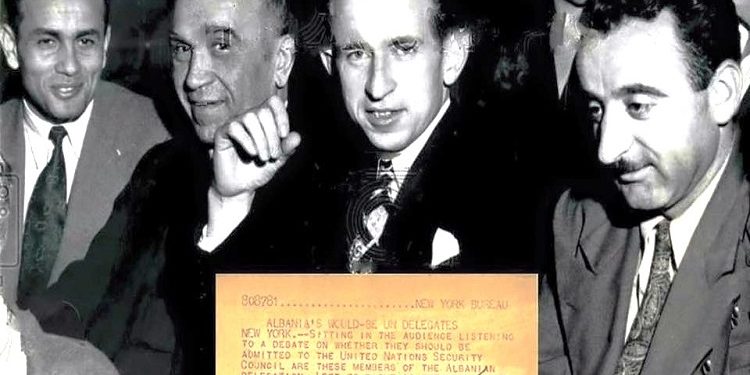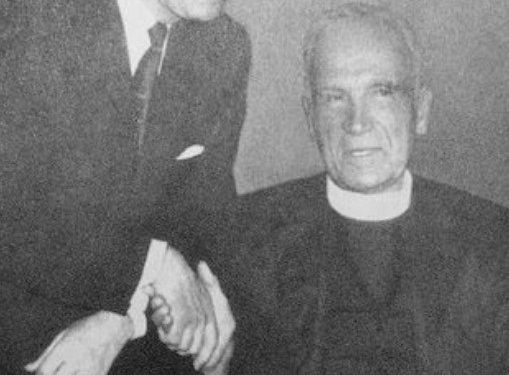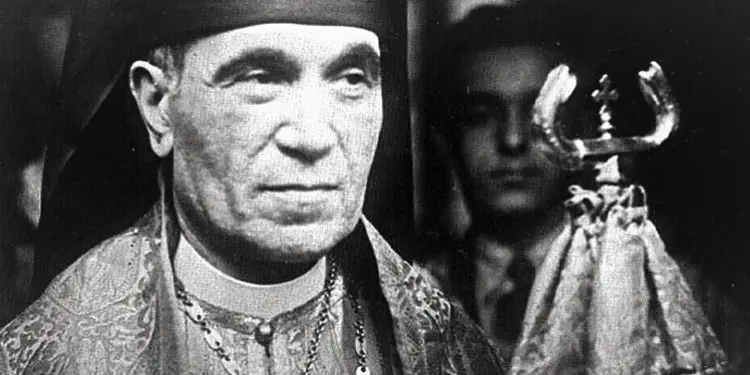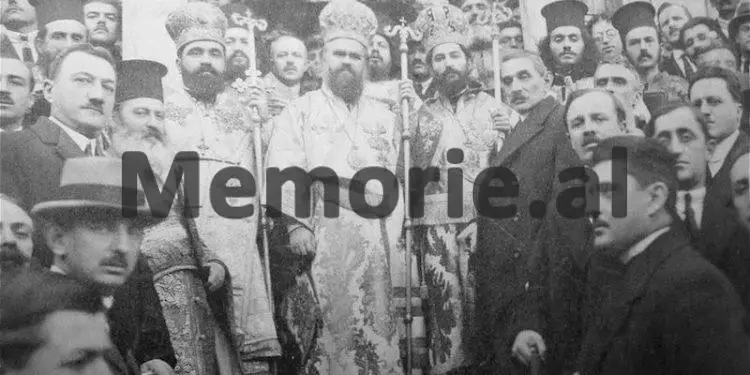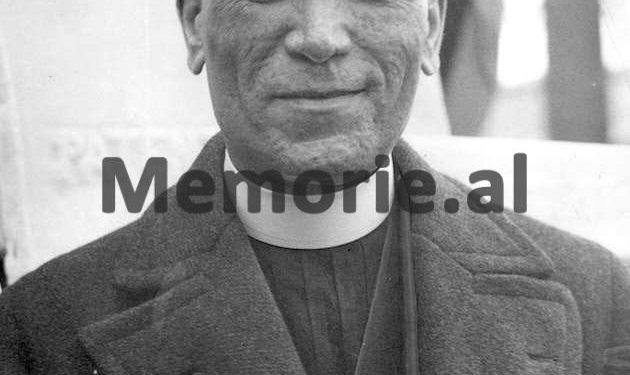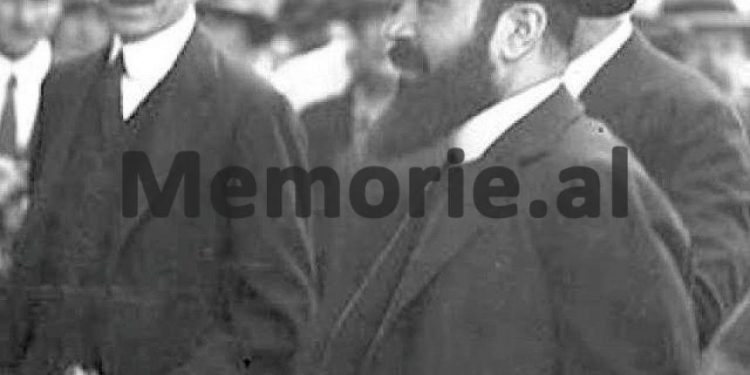By Ilir DHIMA
Memorie.al / Once, when we were making a documentary that would be broadcast by RTSH on 06.01.1982, on the occasion of the 100th anniversary of Fan Noli’s birth, a lawyer friend of mine from Korça, Vladimir Molla, informed me that he had come across a private collection in that city, where there were also some film sequences, which showed the Bishop, entering his house, in Florida (USA). It was the only authentic document of invaluable value, which increased the popularity of our documentary.
It was this good friend who shook the dust off the collections, handing us a cassette where a conversation of Noli was recorded almost in full, with his original voice and processed very carefully from the audio side. This conversation, as it turns out, was made during a meeting in Boston (USA) with Albanians there, 70 years ago. In explaining it, we have tried to remain faithful to the language used by Noli, not written, with a lot of humor and, above all, with a special sense of patriotism.
Fan Noli’s unknown conversation in Boston
Most venerable Imam, most venerable Father, venerable priests, Ladies and Gentlemen!
The doctor who mentioned Faik’s fiddle, sorry (this is about Faik Konica – our note), Faik’s fiddle also reminds me of a story. Both Faik and I have had a weakness for music, and when I went to Albania, knowing the great troubles we had to face, I took a fiddle with me (laughter in the hall), so that here and there we can forget our troubles…! “How things are going in Albania! Bad or worse – says the boy. What is the reason, I wonder” Well, you know the reason – he said – when the prime minister plays the flute and Albania burns, he does the math! (Hilariousness in the hall)…..
The Evgjičkas of Tirana danced. I happened to be at one of those (laughing with humor) banquets once, and to tell you the truth, I was amazed by those beautiful dances of the Evgjičkas of Albania. And then I remembered that it is not only our Evgjičkas who danced beautiful dances. Those Spanish dances, for example, which are famous all over the world, who dances them more beautifully?! The Evgjičkas and the Evgjičkas of Spain. They are Spanish dances, not the Evgjičkas’ dances, because they differ from country to country.
But the Egyptians have no other work, the desert, and they live with music and art, and they specialize in that branch. So we have the beautiful Spanish dances, played by the Egyptians of Spain and the Egyptians of Spain, the beautiful dances of Albania, which are played by the Egyptians, the beautiful noise played by the Egyptians of Albania, the beautiful noise of Hungary, again the Egyptians of Hungary, and the beautiful noise and dances of Russia, which are again played by the Egyptians and the Egyptians of Russia. All of this reminded me of these last two years, when some compatriots from Macedonia, Yugoslavia and Greece came. And their program, of course, was their dances, which they call national.
In those dances of the Greeks, Macedonians and Serbs, 80% were Albanian dances. That is my impression. It would be a beautiful thing if our people, our Albanians, would also send us a troupe, which would present Albanian dances to us, just as we have seen them, just as I myself have seen them, when the Minister of War called us, and just as I saw them, when Loni Kristo once called us to a wedding in Devoll. Those dances of the Devolls and those dances of the Evgjičkas of Tirana, even those dances that we saw in our village, are truly first-class dances and I can tell you that; the only ones who can stand next to the Albanians are the Spaniards and the Russians.
Our friend, Nik Kreshpani sang us a song of his mother and it reminded me of a story of my mother, sorry. Her praise was this: my son has the thickest eyebrows in the village (laughter). Mother, sorry, didn’t give a damn about what I had behind my eyebrows (joy in the hall). I was very happy that one of our friends mentioned our doctor here, who unfortunately is now sick, and mentioned the great campaign he did for “Albania Riliv”. I, who know how hard it is to collect money from Albanians, am the doctor’s administrator, because he really surpassed all of us. He collected almost 150 thousand dollars and it seems to me that he did a job that will remain in the annals, in the chronicle of Albanians in America.
Now we can come to the topic of the day. Many Albanians complain to us in this way: “Hey, what have you done that you are so proud of”?! And, when they say it to you in this way, of course, it’s as if their tongues are cut off. Because we have not left anything undone, we have done almost everything that we had in our program to do. Our program was to make an independent Albania, we did it, good or bad, we did it; we cannot expect a baby to have all the good things.
A baby must be given time to grow up and show what it is. You cannot scold the parents and say: what have you done with this baby here! You must wait until the baby grows up and shows what a flower it is. Our program was to make Albania, we did it, we made an independent Albania; our program was to make an Autocephalous Church of Albania, we did it, good or bad, we did it, we leave it as a burden for others to do well. Yes, we did it!
Now, after making this praise, we must warn our friends and tell them: that we did not do all this out of nothing, out of nothing. For example, many say that Albanians have not had patriotism. There is nothing more wrong than this. Open Efim Mitko’s “Albanian Bee”, published in 1878, where he collected folk songs, some of which are from the 18th century, and some of which are from the 19th century. I will tell you one of these folk poems, which is in “Albanian Bee”, which proves unequivocally that Albanians had a deep patriotism before what we call the “Modern Albanian Movement” began, which we started since the time of Kristoforidhi, in 1875.
The folk poem that I will recite to you now was written in 1850. When the Labëria Uprising took place during the Tanzimat, Turkey wanted to impose the Tanzimat, a general Kanun for all the regions of Turkey. And then, that meant that Turkey would take away the few rights of self-government that the Albanians had. And so the country would be completely enslaved. And the people rose up. The heroes of this movement were Rrapo Hekali, Hodo Nivica and Gjon Leka. The song that I will tell you now is the song of Rrapo Hekali. Faik always reminded me of this, as he always kept it in his mouth and always recited it. And then I will analyze it for you a little.
“Come, take Rrapo Hekali/ when the mountain calls and shakes/ Come, take Rrapo flowers/ like a nightingale that you took/ a seven-ton pasha/ The cannon went off and you continued/ the bullets fell on your shoulder/ you were not afraid, nor did you flinch/ Because Hodo Nivica went/ he crushed the pig’s thigh/ he raised the flag to the river/ Why do you fight, O door/ Not for me, not for you/ but for all of Albania”. Open Eftim Mitko’s Albanian Bee to find this song written no later than 1850.
Those last three lines show what the purpose of that Uprising was. It was for all of Albania. Now I will give you a brief analysis here so that you can see that this poem is a true masterpiece, which could have been written by one of the world’s first poets. Just look at how Rrapo describes Hekali. In the time of Rrapo Hekali, there were no telephones. And when Rrapo Hekali called the Labërs to gather to fight, the only telephone he had was his voice.
And look how beautifully he describes it: “Come on, Rrapo Hekali/ when you call, the mountain shakes…”! When he shouted: heeej or friends, and the whole mountain shook, all the Labërs heard it, and everyone gathered. The next three lines: / blessed as you nightingale that you took/ a pasha with seven garments…! The pasha that took had seven fear. The garment were exactly like those stars that American generals wear.
We have generals with one star, generals with two stars, with three stars and with four stars. There are no generals above four stars. Also in Turkey, there were pashas with four stars, but not pashas with seven stars (laughter). Yes, the poet means that what pasha took, ay pasha was twice as many as the other pashas, that is, the best general of Turkey. And Rrapo Hekali crushed him (applause).
Now look at the three lines that follow. What strategy, what tactics did Rrapo Hekali maintain, that crushed this first-rate general of Turkey: “The cannon went off and you went on/ the bullets fell on your shoulders/ you did not fear, nor did you flinch…”, that is, with simple bravery. And no other craft, no other skill. Now, what was it that prompted him, what caused this unbroken surge of the Albanians? The poet tells us again in three lines: “Because Hodo Nivica went/ he broke the pig’s thigh/ he raised the flag to the well…”!
The pig, whose thigh Hodo Nivica broke was the Turk; the flag to the well was the flag of the uprising, the flag of freedom. And finally, the purpose for which this whole war was fought, again in three lines, the poet says, the great master does not waste many words, two or three words are enough for him: “Why do you fight, O door/ Neither for me, nor for you/ but for all of Albania…”!
So we did not invent, we did not invent Albanian patriotism, we found it. The only thing we did is that we tried to organize, to channel that patriotism that existed among Albanians. That’s all we did. Now, the reason why we did well was that we had a people who truly loved Albania. And a people who not only had patriotism, the virtue of patriotism, but also had several other virtues, of which I will mention only one, which all the foreigners who have visited Albania have told us.
When Albania entered the League of Nations, the representative of India, who happened to be a Mohammedan, Muhammad Ali, gave this praise to the Albanians: Today, he said, we did the most beautiful thing in getting Albania into the League of Nations. If you study the history of all the nations that have been liberated, you will not find any example like the one we saw today in Albania.
Albania is the only country in which three different religions, the wealthy (followers – our note), whose followers everywhere else slaughter each other, have united to create an independent state. This is the only country, he says, in the world in which Mohammedans, Orthodox and Catholics have all joined together and have created an independent state.
And this, as far as I know, he said, added: it is the only country that has a Mohammedan majority and sends us here as a representative, an Orthodox bishop (long applause). Many of our people say that Albania was created by a minority. Very true, but this is the history of all the nations of the world. Take, for example, India, with 400 million. Who liberated it? Mahatma Gandhi. And what did Mahatma Gandhi say when he started his movement? “First of all, we will take it without weapons, without war.”
And he took it; he won the freedom of India without weapons. “With how many people do you say?” Ay says: “It’s enough for me to have 25 thousand people, who will do exactly as I, say, like soldiers.” And with so many, in fact, that there were no more, he made Hindi with them. Without a war, without firing a shot. And that’s what we did too.
FAN NOLI: WHEN I WORKED IN A BOARD FACTORY
New surprises on the tape. The bishop humorously tells details about the time when he started life in America, or when Konica lived on the money his uncle gave him: We were few here; we could be counted on our fingers. For example, when we founded “Kombi” here. “Kombi” was founded by Sotir Peci. And I was very happy to hear from our friend Antoni Athanas, who mentioned Sotir Peci. Sotir Peci came here and started the newspaper “Kombi” in June 1906. A couple of months later I sent him a speech that I had given at a meeting Albanian.
And he published that word, and then he wrote me a letter saying, if you don’t have any work there, come here so we can try to publish this newspaper together, because I need an assistant. I had a job, but a job that I didn’t like, a job in a board factory (hilarity). So I left the board factory with great joy and came here to Boston, to do a job that suited me better, according to the purpose for which I had come here to America, to do something for the national issue.
And the first thing that Sotir Peci assigned me, sorry, was to come to the colonies and collect subscriptions (subscriptions for the newspaper “our note”). I went to Manchester; I collected one subscription (hilarity). Then I went to Hampshire, I didn’t collect any subscriptions there, because there was an Albanian there and he was a subscriber, he had paid. Then I went with Tili together in Peninkuk. We didn’t do anything there, there weren’t any subscribers, nor did we do anything new.
We entered a guesthouse, and found the guesthouse empty. We entered another guesthouse, empty again. “Hey, there are no Albanians here.” “No, they’re running away as soon as they heard you approaching”! (Laughter). Then I went to Bixhifort, there I had a great success, I collected two subscriptions. Then to Wodoastamejn, there I collected a subscription. And finally in Rotonbejn a subscription. In all, I think, about 24 or 25 dollars were collected, of which more than half went to the way.
I didn’t bring the change to Sotir Peci and the conclusion was this: “Well, that’s how it’s done,” he said. “As if I told you it’s done! It’s neither done, nor is it to be done. This work of ours has neither beginning nor end.” Take the Albanian issue, as we found it then. No organization. There were only two or three people who published a few newspapers on their own. We had Shahim Kolonjë, who published “Dritë”, together with Kristo Luarasi. And the whole thing there was that Kristo Luarasi was very good, he had a printing house and was a good businessman. Not that the Albanians helped him.
And Faiku lived because he had a rich uncle in the Palace of Sultan Hamit. And that’s the joke. His grandfather worked for Sultan Hamit and supported Faiku. He worked against the Dovlet, to create a free Albania. How did this strange thing fit?! That poor man had no sons, he only had maids. He had three maids, no sons. And he had Faiku as a son. Faiku, sorry to say, spent more than he had and every month he sent the bill (invoice-our note) to his uncle, the uncle immediately wrote the check. And so the newspaper was published there.
Then the Turks arrived and killed the uncle, and Faik’s work was over. It ended. And he came here to America, to live with us. However, after him came Peci. Peci came, not because he had any support from the people. This was the work of the Albanians. Naum Cerja told a nice joke. We had a meeting and at that meeting Faik spoke, and others spoke too. And when the meeting was over, Faik asked Naum Cerja: “How did you like this meeting?”
“When you said one word, oh, oh, tears flowed down my face” – he said. – “But why did you lie to me”. – “Yes, I lied to you, when you said that with Albanians like you we are sure that things will go well for us”. – “Well, that’s not true”. – “No, sir,” he said, as if it were true, but you and I were Albanians, both of us. The others were shirxhins, it went in one ear and out the other. That’s why I burst into tears.”
However, the beauty is that, although we started it with so few people, our work went well. Why? Because those few who started it had the sacred fire, says the Frenchman. And only a small minority manages to have that fire. Even a small minority, if they have a field to work in, they finish the job. And the field was, as I told you, that Albanians were patriots long ago, we didn’t make them patriots. They were, and they were capable, and they were brave.
They just needed leadership, and God gave them some leaders for their rebirth, and that’s how the work went well. We started the Nation and then, after three years, Sotir Peci left. Here, he said, there’s no work to be done. I will go to Albania. And he went to the Congress of Manastir then and then he stayed in Albania. Then he went to the “Normal” School, as you know, and finally became one of the members of the Regency Council.
But, anyway, from “Kombi” was born “Dielli” (we are talking about the newspapers of the Albanians of America, our note). When Sotir Peci left us a printing house here. That printing house was at 100 Haston Street, on a floor. When we found the trouble here, winter hit us and we had nowhere to go, we also took another shirt, because the coats were very expensive and that’s how we got through. And Sotir Peci left them unpaid.
And some of the boys who had given them, the money, that first payment, when he bought them, gathered. And they said: “What are we going to do with these”? Some said we should sell them, some said no, we shouldn’t sell them but we should continue the newspaper, publish another newspaper. We can’t publish “Kombi” without the permission of the editor (publisher), but we can publish another newspaper. But in order for us to continue it, to publish another newspaper, we had to pay for them, the machines, which were unpaid.
So we gathered under the leadership of Kristo Cirko, the late poet, and Misto Millonaj, who gathered some of the dardhars, Kristo Cirko gathered some of the Korçars, some of our Vakfllins, whose names it is not necessary to list now, Dhima, Dhima Peterson and others, and they paid for all this and told us: “Here are the machines and publish the newspaper”! And so we started “Dielli”, exactly with the same method with which we published “Kombi” in Pec.
I would sort it together with Thimaq and then we would print it on that smoky floor, working with our feet (of the machines, our note). We were boys back then, very brave, very healthy. The newspaper was launched with all this poverty and all this hardship, on February 15, 1909. In November 1915 it became a daily. This newspaper used to be published once a week, then twice a week, three times a week, and then it became a daily, when the editor, sorry to say, Kostë Çekrezi, who among other virtues had the virtue of being a rare worker, perhaps the greatest worker that “Përlindja Shqiptare” has ever published.
Now, you should keep one thing in mind: “Dielli” really progressed and managed to become a daily, and continued to be a daily for several years. The publication of “Dielli” became rare again, because half, more than half of the best Albanians we had here, flocked like cattle, like a herd, and returned to Albania, as soon as the country was opened. And that crippled the “Rilindja Kombëtare” here. They went there and thought that when they returned they would find the door open again. When they tried to return here, the door was closed, and they could not come.
But anyway, despite all those struggles, “The Sun” continued. But how did it continue? You should always keep this in mind. “The Sun” could not survive only on subscriptions. If I ask you, no newspaper in the world survives only on subscriptions, it survives on advertising. And we do not have advertising, because, of course, the public that sings that newspaper is a small, very limited public and no one advertises, without expecting to receive profits from that advertising. So we should not despair, when we see that from time to time “The Sun” gets stuck and waits for our help.
Now, what can I tell you about the continuation of “The Sun”? The only thing I can tell you is this: just as we had this beautiful meeting today, where we gather from all over America and get together and have fun, it would be good to get together every three years, I think. And so we should celebrate it. As for that, the case let the Chairman of “Vatrë” give it a name, baptize it. But it seems to me that every three years we should gather here and help “Dielli” to continue publishing. This gathering had another purpose. We no longer know each other, and it turns out – slowly this account of ours is also being shortened, closed. So it is good to mature every two or three years, because who knows when we will mature again.
Another thing that I want to recommend to you is this: “Dielli” will continue only as long as the old generation continues. So this matter is in our hands, the old generation. And we are here to tie the knot so that none of us will go, near God I mean. None of us will go without getting permission from our friends (cheerful laughter). And if we all keep this rule, I’m sure we’ll all gather here safe and sound, to celebrate the 100th anniversary of “Diellit”, as young as we are now (roaring applause). / Memorie.al




